5+ Books Exploring Filipinx American Experiences for Filipinx American History Month
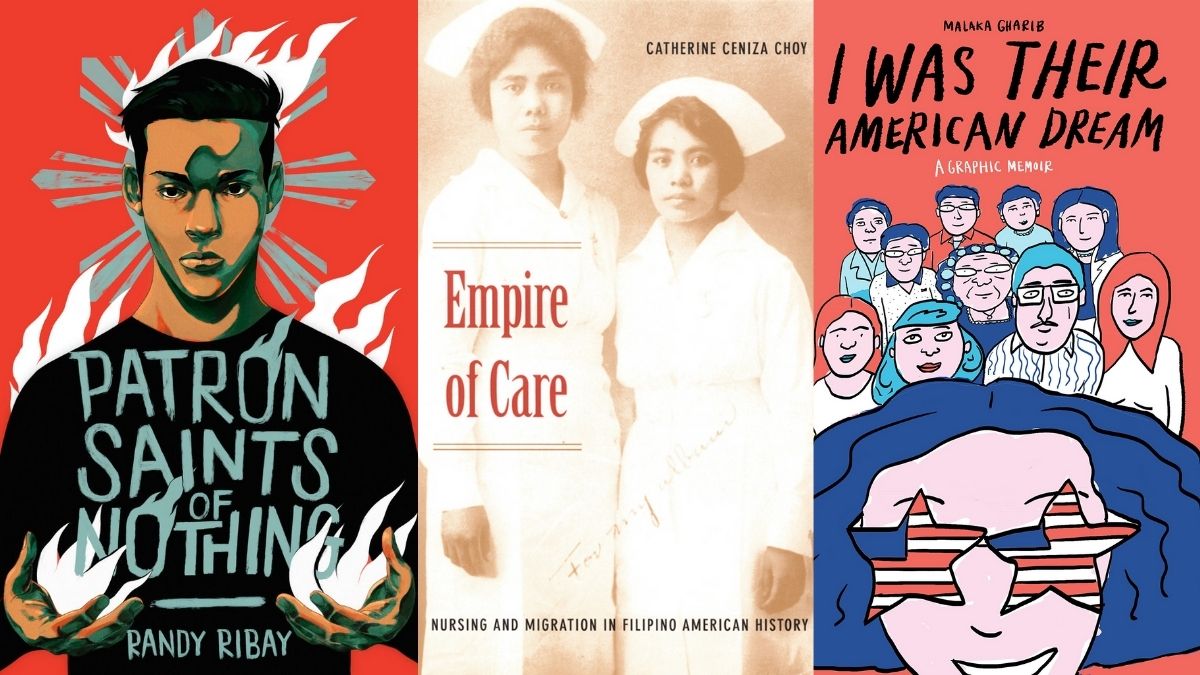

October is Filipinx American History Month and was dubbed so to commemorate the arrival of the first Filipinx people to come to California in the late 1500s. Feeling like this was a forgotten group within Asian American communities, Fred Cordova pushed for national recognition in the 1980s.
These books center some of the experiences of Filipinx Americans, and many of them fit the year’s theme to reflect “on how the Fil-Am community has been involved in social justice movements over the years.”
Patron Saint of Nothing by Randy Ribay
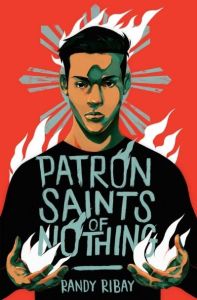
(Image: Penguin Books.)
17-year-old Jay travels to the Philippines for the first time in about a decade to find out what happened to his cousin Jun—a cousin, while hundreds of miles away, he would communicate with regularly like a brother. Those in his family that will even acknowledge Jun’s disappearance feel that it is the price to pay for getting involved with drugs. Jay is told over and over again that compassion is weak and (then-current) President Duerte is leading the country to greatness.
The YA murder mystery both is weighted with Jay’s identity crisis and the real police violence in the Philippines. Elected around the same time as Trump, Duterte has taken a by any means necessary route to get drugs out of the Philippines. Instead of safe, humane, and effective measures, the president allows for civilians to kill those suspected of using. That he calls it a “social cleansing” and likens himself to Hitler tells you a lot. You don’t really need to know about all this going in, and can discover it alongside Jay.
Empire of Care: Nursing and Migration in Filipino American History by Catherine Ceniza Choy
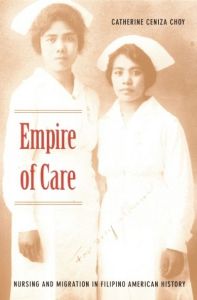
(Image: Duke University Press)
Early on during the COVID-19 pandemic, Vox put out a video explaining why the U.S. has so many Filipino nurses, and this book is the more detailed history of this relationship. This is not just important to know because it serves as a reminder of the imperialist labor supply chains the U.S. continues to this day, but also because the death rate of Filipinx nurses during the pandemic has been among the most deadly. It feels like a lot of books about the human condition more broadly and past pandemics have been shared the last year and not enough about the people who fight them. They represent 4% of nurses, but 25% of nurse COVID-19 deaths as of June 2021.
The systems you will learn about in this book do not just apply to nursing, and similar routes are used to fill the shortage of teachers. This was an issue before the pandemic and is being exacerbated. Companies are looking to the Philippines for nurses, teachers, call center employees, and so much more to outsource labor (undercutting unions) and due to the trilingual nature of the nation’s history. Like many other immigrants, they are exposed to terrible working conditions, being underpaid, and threats to being deported. It is a mess, and this book traces the history of one vein of the mess.
Arsenic and Adobo by Mia Manansala
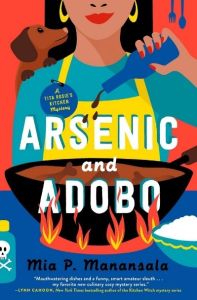
(Image: Berkely Books)
Probably the silliest book on this list, it still has cultural touchstones from food to family recognizable to many Filipinx Americans. Back in town from a messy breakup, Lila returns to working at her Tita Rosie’s restaurant and the book starts as a typical romantic comedy romp—that is, until her ex (also the local food critic everyone hates–including me) comes in with his stepdad to eat at Tita Rosie’s and ends up dying mysteriously at his table, mid-bite. Chaos ensues, and Lila is the prime suspect. The match-making aunties who have nothing better to do than criticize Lila certainly aren’t going to help, either.
When you get this book, skip to the end, and you’ll find a few recipes from Tita Rosie. Even messing up one thing (I bought boneless instead of drumsticks, as recommended), the one I tried was great. Manansala gives us sweet, she gives us savory, and most importantly for many, she gives us instructions and alternatives for those not near an Asian food market. The next book in the Tita Rosie’s Kitchen Mystery series, Homicide and Halo-Halo, releases February 8, 2022.
Global Divas: Filipino Gay Men in the Diaspora by Martin F. Manalansan IV
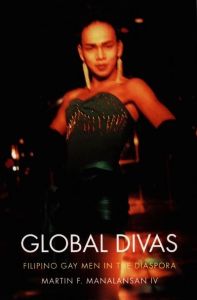
(Image: Duke University Press)
There is no talking about the history of any group without acknowledging the spectrum of LGTBQ+ folks within said group. This text looks at the layered identities of gay Filiphinx immigrants, specifically in New York City—how they navigate queerness in and out of the community, immigration, racial politics and more. Not only does it cover navigation through existing paths, but also forging their own like other queer people of color have been required to to survive. Author and professor anthropology Manalansan has written several books on queer people of color as well as Filipinx Studies and Asia American Food.
Speaking of the LGBTQ+ community, I wanted to add that the first openly trans woman, Kataluna Enriquez (Nevada), will compete in November’s Miss USA contest and is a Filipina American.
I Was Their American Dream: A Graphic Memoir by Malaka Gharib
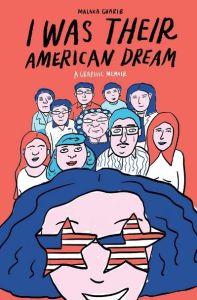
(Image: Clarkson Potter Publishers)
The other day, I admitted that I’m a sucker for graphic novel biographies, memoirs, etc, so of course, I found one for this list. This coming-of-age novel follows a first-generation American who, on top of adapting to the white-dominant American culture, yearns to appease her parents’ expectations. That expectation is not always aligned, as one side of the family comes from the Philippines while the other hails from Egypt. Malaka both is able to critique the cultures she is part of and find the best parts of them because of her intimate relationships.
(image: Penguin Books, Duke University Press, and Clarkson Potter Publishers.)
The Mary Sue may earn an affiliate commission on products and services purchased through links.
Want more stories like this? Become a subscriber and support the site!
—The Mary Sue has a strict comment policy that forbids, but is not limited to, personal insults toward anyone, hate speech, and trolling.—
Have a tip we should know? [email protected]
